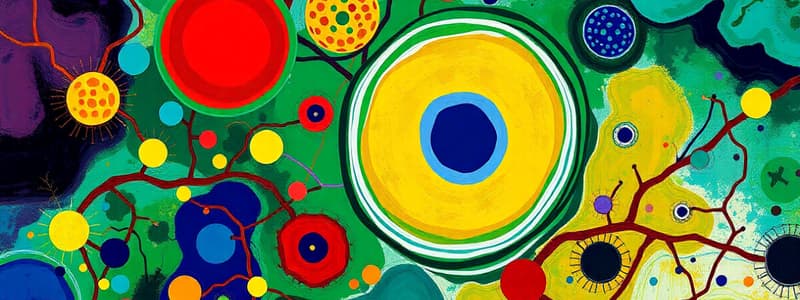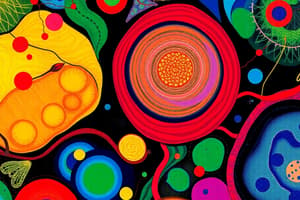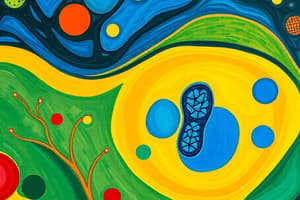Podcast
Questions and Answers
What is the main focus of genetics in biology?
What is the main focus of genetics in biology?
- Study of heredity and variation (correct)
- Study of ecological interactions
- Study of plant structure
- Study of animal behavior
Which process do green plants use to synthesize food?
Which process do green plants use to synthesize food?
- Photosynthesis (correct)
- Decomposition
- Cellular respiration
- Fermentation
Which level of organization is defined by structures made up of different tissues?
Which level of organization is defined by structures made up of different tissues?
- Tissue Level
- Cellular Level
- Organ Level (correct)
- Molecular Level
What mechanism of evolution is characterized by reproduction success of organisms best suited to their environment?
What mechanism of evolution is characterized by reproduction success of organisms best suited to their environment?
Which of the following best defines homeostasis?
Which of the following best defines homeostasis?
Based on biology, what are proteins primarily composed of?
Based on biology, what are proteins primarily composed of?
Which term describes the interaction where one organism kills another for food?
Which term describes the interaction where one organism kills another for food?
What are the basic units of heredity that play a crucial role in genetics?
What are the basic units of heredity that play a crucial role in genetics?
Flashcards are hidden until you start studying
Study Notes
Overview of Biology
- Study of life and living organisms.
- Covers their structure, function, growth, origin, evolution, and distribution.
Major Branches of Biology
- Botany: Study of plants.
- Zoology: Study of animals.
- Microbiology: Study of microorganisms.
- Ecology: Study of organisms and their environment.
- Genetics: Study of heredity and variation.
- Cell Biology: Study of cell structure and function.
Fundamental Concepts
- Cell Theory: All living organisms are composed of cells; the cell is the basic unit of life.
- Homeostasis: The ability of an organism to maintain stable internal conditions.
- Evolution: Change in the heritable characteristics of biological populations over successive generations.
Levels of Organization
- Molecular Level: DNA, proteins, carbohydrates, lipids.
- Cellular Level: Cells as basic units of life.
- Tissue Level: Groups of similar cells performing a specific function.
- Organ Level: Structures made up of different tissues.
- Organ System Level: Groups of organs working together.
- Organism Level: Individual living entities.
Key Processes in Biology
- Photosynthesis: Process by which green plants use sunlight to synthesize foods with carbon dioxide and water.
- Cellular Respiration: Process of converting glucose and oxygen into energy, carbon dioxide, and water.
- Reproduction: Mechanism of producing offspring; can be sexual or asexual.
Important Biological Molecules
- Proteins: Comprised of amino acids; vital for structure, function, and regulation.
- Nucleic Acids: DNA and RNA; responsible for genetic information.
- Carbohydrates: Sugars and starches; primary source of energy.
- Lipids: Fats and oils; important for storage and cellular structure.
Genetics and Evolution
- Genes: Units of heredity; segments of DNA.
- Natural Selection: Mechanism of evolution; organisms best suited to their environment reproduce more successfully.
- Mutation: Changes in DNA sequences; source of genetic variation.
Ecological Interactions
- Predation: Interaction where one organism (predator) kills another (prey).
- Symbiosis: Close, long-term interaction between species (e.g., mutualism, commensalism, parasitism).
- Ecosystems: Complex networks of biotic and abiotic components interacting.
Human Biology
- Anatomy: Study of body structure.
- Physiology: Study of body function.
- Immune System: Defense system against pathogens.
Scientific Method
- Observation: Identifying a problem or question.
- Hypothesis: Formulating a testable explanation.
- Experimentation: Testing the hypothesis through controlled experiments.
- Analysis: Interpreting data and drawing conclusions.
- Reporting: Sharing findings with the scientific community.
Current Trends in Biology
- Genomics: Study of genomes; enables understanding of genetics at a broader scale.
- Biotechnology: Use of living systems or organisms to develop products (e.g., genetic engineering).
- Conservation Biology: Study aimed at protecting biodiversity and ecosystems.
Overview of Biology
- Biology is the study of life and living organisms covering aspects such as structure, function, growth, origin, evolution, and distribution.
Major Branches of Biology
- Botany: Focused on the study of plants.
- Zoology: Dedicated to understanding animals.
- Microbiology: Examines the world of microorganisms.
- Ecology: Investigates the relationships between organisms and their environments.
- Genetics: Explores the mechanisms of heredity and variations within organisms.
- Cell Biology: Delves into the structure and functions of cells, the fundamental units of life.
Fundamental Concepts
- Cell Theory: All living organisms are composed of cells, underscoring the cell as the basic unit of life.
- Homeostasis: The ability of an organism to maintain stable internal conditions, crucial for survival.
- Evolution: Describes the gradual change in the heritable traits of biological populations over time.
Levels of Organization
- Molecular Level: Focuses on the building blocks of life, including DNA, proteins, carbohydrates, and lipids.
- Cellular Level: Examines cells as the fundamental units of life, responsible for carrying out essential functions.
- Tissue Level: Groups of similar cells working together to perform specific functions.
- Organ Level: Structures composed of different tissues, working together in a coordinated manner.
- Organ System Level: Groups of organs collaborating to carry out complex processes in the body.
- Organism Level: Represents individual living entities, encompassing all levels of organization.
Key Processes in Biology
- Photosynthesis: The process by which green plants use sunlight to synthesize food using carbon dioxide and water, forming the basis of energy flow in ecosystems.
- Cellular Respiration: The process of converting glucose and oxygen into energy, carbon dioxide, and water, providing the energy needed for vital functions.
- Reproduction: The mechanism by which organisms generate offspring, ensuring the continuation of life through sexual or asexual processes.
Important Biological Molecules
- Proteins: Composed of amino acids, proteins play vital roles in structure, function, and regulation within organisms.
- Nucleic Acids: DNA and RNA are responsible for storing and transmitting genetic information, directing the functioning of cells.
- Carbohydrates: Sugars and starches are the primary source of energy for most organisms.
- Lipids: Fats and oils serve as important energy reserves and contribute to cellular structure.
Genetics and Evolution
- Genes: Units of heredity, segments of DNA responsible for carrying specific traits.
- Natural Selection: A fundamental mechanism of evolution, where organisms best adapted to their environment have a higher chance of survival and reproduction.
- Mutation: Changes in DNA sequences, providing a source of genetic variation that drives evolution.
Ecological Interactions
- Predation: An interaction where one organism (predator) kills another (prey) for food.
- Symbiosis: Close, long-term interactions between different species, including mutualism (both benefit), commensalism (one benefits, the other is unaffected), and parasitism (one benefits, the other is harmed).
- Ecosystems: Complex networks of biotic (living) and abiotic (non-living) components interacting, demonstrating the interdependence of life.
Human Biology
- Anatomy: The study of the structure of the human body.
- Physiology: The study of the function of the human body.
- Immune System: The body's defense system against pathogens, protecting against disease.
Scientific Method
- Observation: Identifying a problem or question, initiating the scientific process.
- Hypothesis: Formulating a testable explanation for the observed phenomenon.
- Experimentation: Designing and conducting controlled experiments to test the hypothesis.
- Analysis: Interpreting the collected data and drawing conclusions based on the results.
- Reporting: Sharing findings and conclusions with the scientific community through publications and presentations.
Current Trends in Biology
- Genomics: The study of entire genomes, providing insights into genetics on a grand scale.
- Biotechnology: Using living systems and organisms to create valuable products, including genetic engineering and biopharmaceuticals.
- Conservation Biology: Dedicated to protecting biodiversity and ecosystems, addressing challenges posed by human activities.
Studying That Suits You
Use AI to generate personalized quizzes and flashcards to suit your learning preferences.




